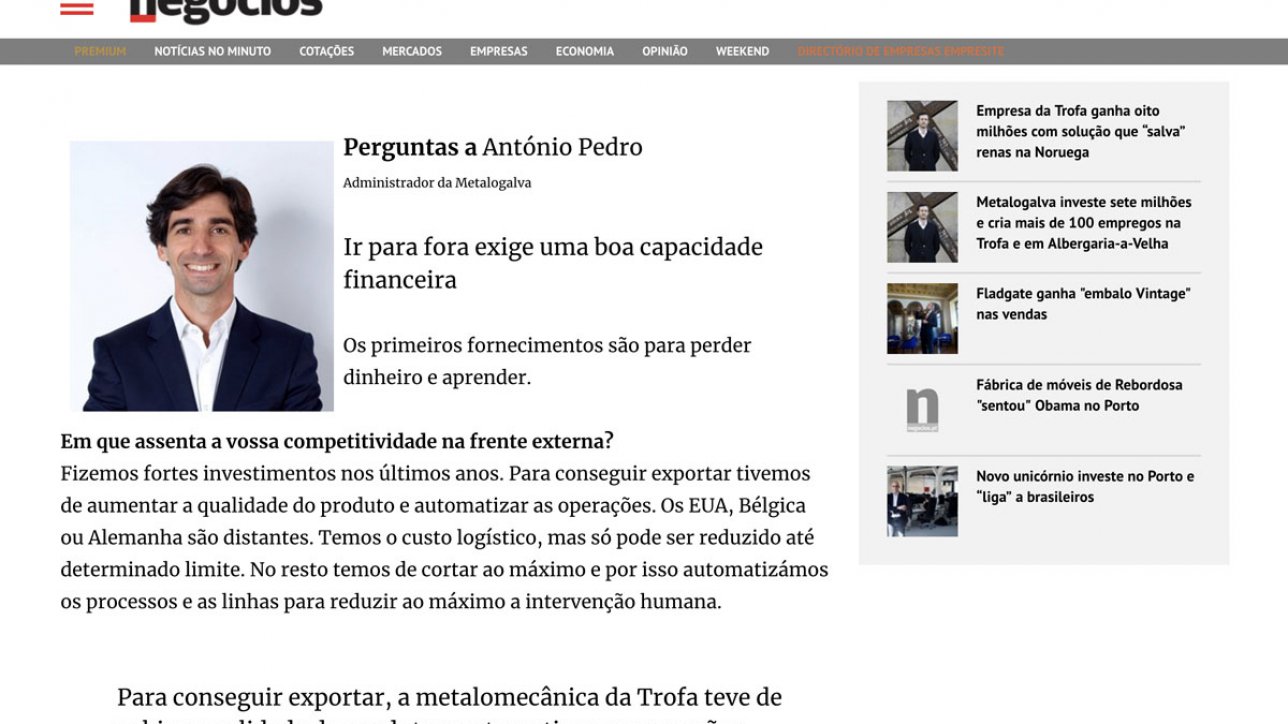The consolidated turnover of Metalogalva, led by Sérgio Silva, amounted to 99 million euros in 2017.
António Larguesa
16 de outubro de 2018 às 15:00
Eight years after jumping borders with the “push” of the crisis in Portugal, a metalworking company from Trofa is joining forces with a giant from the Middle East to produce metal structures for renewable energy projects.
Metalogalva is building a metal structure factory in Saudi Arabia to participate in renewable energy projects throughout the Middle East and North Africa. The investment is being made in partnership with the giant Al Babtain, a listed company four times the size of the Trofa metalworking company, which controls 60% of this joint venture.
António Pedro, the company’s director, explained to Negócios that this 70-employee operation came about after “American and German clients asked for a solution for local manufacture” of the components, since this way they don’t pay customs duties and the legislation in those countries imposes strong limitations on the import of materials for solar parks. The first project has already been awarded and the plant will start operating in December.
From the sand floor – because it’s in the middle of the desert – to starting production, in nine months we have an operational factory up and running. António Pedro, Director of Metalogalva.
“From the sand floor – because it’s in the middle of the desert – to starting production, in nine months we have an operational factory up and running,” said the manager, detailing that Metalogalva, which invested almost 500,000 euros in the purchase of the stake and capital increase, was responsible for selecting the industrial equipment and will also be sending technical, quality and production teams to start up the operation in the coming weeks.
This is the latest international adventure for the company created in 1971 by brothers Adelino and Joaquim Silva, who were “pushed” abroad by the latest crisis in Portugal. “As we are linked to infrastructures and dependent on public investment, exporting and internationalizing was a necessity,” recalled António Pedro. At the beginning of this decade, the company made its debut in France, where it maintains a commercial delegation (the same solution it adopted in Spain, Canada and Senegal).
12Markets
Metalogalva has a physical presence in 12 countries, with industrial units in five.
In the UK, Belgium and Germany, it has added logistics bases to these sales offices. In addition to Saudi Arabia and the five national units – spread across Trofa, Vila do Conde and Albergaria-a-Velha – it has factories in Brazil (a 50/50 joint venture for renewable energy projects), Ukraine and Algeria, the latter two dedicated to street lighting columns.
Under the executive leadership of Sérgio Silva and part of the family-owned Vigent Group, which also owns Brasmar (which processes and sells frozen seafood), Metalogalva employs 670 people in Portugal and had a consolidated turnover of 99 million euros in 2017, more than 70% through exports.
The United States (22%), France and Germany (both with 12%) and Belgium (10%) are the best destinations abroad. And while metal structures for solar parks are the best-selling product abroad, the items most seen by the Portuguese are street lighting columns and poles from REN and EDP.
 |
António Pedro Administrador da Metalogalva |
Going abroad requires a good financial capacity
The first deliveries are about losing money and learning.
What is the basis of your competitiveness on the external front?
We have invested heavily in recent years. To be able to export, we’ve had to increase product quality and automate operations. The USA, Belgium or Germany are far away. We have logistics costs, but they can only be reduced to a certain extent. For the rest, we have to cut as much as possible and that’s why we’ve automated processes and lines to reduce human intervention as much as possible.
To be able to export, the Trofa metalworking company had to improve the quality of its products and automate its operations.
Is local presence relevant?
The strategy of having local operations with local people – they’re not expats – makes a difference with the client. Because they understand the culture, speak the same language and know the client’s way of working. They may not be as good at the product, but our technicians fly in from here. On the other hand, the acquisition of two competitor companies [in Belgium and Germany] has also made us grow faster. And then it’s important to have teams that don’t give up, because it’s difficult for a foreign company to get started in a market where it faces local competitors. You don’t just look at price, but also logistics, support and language. We had to develop these aspects.
And what’s the biggest lesson to share with those starting out abroad?
Anyone who goes abroad has to have a good financial capacity because the first few jobs won’t pay off straight away. The first deliveries are tough, the first and second jobs are going to make a loss, until you understand how to succeed. And you can’t give up at the first, second or third attempt, but learn from each delivery and improve.

